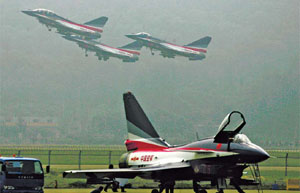Economy
Measures to arrest price hikes
By Hu Yuanyuan and Wang Xiaotian (China Daily)
Updated: 2010-11-18 09:15
 |
Large Medium Small |
Government to boost food supplies, provide subsidies for less well-off
BEIJING - The State Council, China's Cabinet, is drafting a slew of measures to suppress rising commodity prices, Premier Wen Jiabao said on Wednesday.
The measures include boosting food supplies and other necessities, increasing subsidies for low-income families and taking more targeted policies to maintain market order, according to a statement on the government's official website www.gov.cn.
"We need to understand the importance and urgency of stabilizing market prices and take forceful measures," it said after a State Council meeting chaired by Wen.
"When it is necessary, contemporary measures could be taken to interfere with the prices of some important daily necessities," the statement added.
The State Council singled out grain, edible oil, sugar and cotton as markets that it wanted to stabilize. It also vowed to intensify a crackdown on price speculation and to punish those found hoarding commodities and pushing up prices by illegal means.
The statement made no mention of monetary policy.
Meanwhile, in a bid to guarantee market supplies and curb price rises, the Ministry of Commerce (MOC) announced on Wednesday that authorities will auction 200,000 tons of reserve sugar on Nov 22.
The reserve sugar will be sold to Chinese food processing companies at a base price of 4,000 yuan ($597) per ton, said an MOC notice.
Sugar prices have risen to more than 6,000 yuan per ton from 2,800 yuan per ton in October 2008.
China's consumer price index (CPI), a key gauge of inflation, surged 4.4 percent year-on-year in October to a 25-month high, stoking inflation fears, the National Bureau of Statistics (NBS) said on Nov 11.
Worries that the government could start tightening more aggressively drove China's main stock index down by 1.9 percent on Wednesday to a one-month closing low. The index has dropped 11 percent over the past four trading days.
Shi Chenyu, an economist with the investment banking arm of the Industrial and Commercial Bank of China, said the sternly worded statement showed that inflation had reached the top of Beijing's policy agenda.
"The government often opts for iron-fisted administrative measures to control prices when inflation becomes a serious problem," Shi said. "However, harsh administrative measures may backfire as expectations of further price rises may intensify."
The State Council said it would hold provincial governors accountable for the prices of "rice bags" and make mayors responsible for "vegetable baskets".
In another development, the consumer confidence index, the main gauge of confidence in the economy, dipped in the third quarter after experiencing five consecutive quarters of increase, due to growing worries over inflation, according to research conducted by the NBS and the Nielsen Company.
According to the report, the index fell 5 percentage points on a quarterly basis to 104.
"The index fell because consumers are less willing to buy," said Pan Jiancheng, deputy director general of the China Economic Monitoring & Analysis Center at the NBS.
The confidence index for urban consumers was stable on a quarter-on-quarter basis at 101 while that for rural residents, who are less well-off and more sensitive to price rises, fell 11 points to 106 after five consecutive quarterly gains, the report shows.
Mitch Barns, president of Nielsen's Greater China, said the fall in rural consumer confidence was understandable given its previous rises.
"Natural disasters that have hit rural areas during the current quarter coupled with an increase in consumer prices are two key factors affecting rural consumers' attitude in this quarter," Barns said. "I would expect the index to be flat or dip slightly in the next quarter."
Rising concern over price increases, however, is not expected to affect positive consumer attitude toward the coming year, according to the report.
"Such a shortage is temporary and could be largely improved as supply catches up," said Pan.
For Wang Tao, head of China research at UBS Securities, the country's CPI will probably hit 5 percent year-on-year in November, but may fall in December due to a higher basis last year.
"I believe inflation risks for next year are still controllable," said Wang. "And to keep it under control, the government should increase imports, stabilize supply, and offer subsidies to low-income families."
Monetary policies such as increasing interest rates can also help manage inflation and prevent price hikes in certain sectors from spilling over into other commodities, she said.
Xinhua, Reuters contributed to this story.




